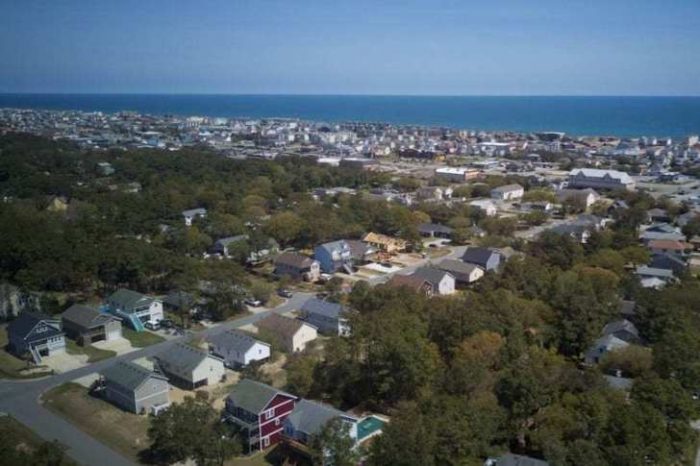What’s my home worth?

With revaluation, Dare property owners will soon find out
Sometime in February, the owners of nearly 44,000 Dare County properties will receive notices telling them, hopefully as accurately as possible, what the market value of their properties are as of Jan. 1, 2020.
Right now, public interest in the county’s first the first property revaluation since 2013 isn’t exactly boiling over. A scheduled public hearing on the issue at the Nov. 18 Dare County Board of Commissioners meeting drew exactly zero speakers.
But once commercial and residential property owners receive those notices of their new values, which impact their ad valorem taxes and factor into real estate sale prices, interest is likely to rise.
There will be some complaints as well. Dare County Tax Assessor Greta Skeen says her department usually projects that about 10 percent of property owners will challenge their appraisals — through an appeals process that functions as several levels.
State law mandates that revaluations be conducted at least once every eight years, and Dare County pushed the process ahead slightly with this revaluation coming seven years after the previous one. While many counties contract out that work, Dare County does the appraisals in house, with a 12-person department. Such factors as sale prices and land values in the neighborhood, as well as the physical condition of the property, are crucial elements in the appraisals.
All properties in the county are examined and appraised during this process, and here are some of the relevant numbers.
- In all of Dare County, there are currently 43,500 real property parcels.
- The total value of all the property in Dare County, the current real property tax base, is $12.5 billion dollars.
- Of those real property parcels, 90% are residential; 5% are commercial; and 5% are exempt, such as properties with government and religious uses. Of all taxable parcels, 15% are vacant (unimproved).
- While it is impossible to know exactly how many Dare property owners actually live here, 20,016 parcels—accounting for 46% of all parcels countywide — are listed with Dare County zip code mailing addresses. In theory, that means slightly more than half of property owners live out of the county. (Skeen says, “the last time I checked, we have property owners from every single state and about fifteen to twenty foreign countries.”)
- The last such appraisal took place in 2013, eight years after the previous one in 2005. Due in great measure to the Great Recession and housing crash in the previous decade, the overall property tax base fell by a full 30% from the 2005 to the 2013 revaluations.
No such overall drop in value will occur this time around. And although Skeen says, “it’s too soon in the process” to venture a guess on what that number will look like, assistant county assessor Hosea Wilson says, “the market is trending up.”
So far, in 2019, he explains, the North Carolina Department of Revenue’s random sample of Dare County real estate sale prices are running, on average, nearly 17% higher than the current assessments on those properties.
The appeals process
The goal of revaluation is to come up with a number that is as close to 100% of a property’s market value as possible. But some property owners will take issue with their values. And that’s where the appeal process comes in.
One option for property owners is to seek what is called an “informal appeal” to be adjudicated by the Dare County Tax Assessor’s office. Out of town owners can appeal by mail, but someone can also request a face to face meeting with an appraiser.
Another option for an appeal is the Dare County Board of Equalization and Review, which currently consists of three real estate agents, an attorney and a builder who have been appointed by the Dare County Commissioners. Property owners can appeal directly to that board or they can appeal to it after getting what they view as an unsatisfactory decision from the Tax Assessor’s office. That is a somewhat more formal process and the Board of Equalization and Review meetings are public.
If someone wants to appeal a ruling from the Board of Equalization and Review, that is done through the State Property Tax Commission. At that level, residential property owners can represent themselves, but commercial property owners must be represented by an attorney. The county will also be represented by an attorney in that process.
*******
Anyone wanting to truly immerse themselves in the revaluation process can peruse the “2020 Schedules, Standards and Rules for Real Property Appraisal,” a daunting-looking and very lengthy document on the county website that takes a while to download.
For others, however, the reality of revaluation may not hit home until something significant shows up in the mailbox.
“We try very hard to make the process as transparent as we can,” says Wilson, but “sometimes it doesn’t get people’s attention until they get their tax bill.”









